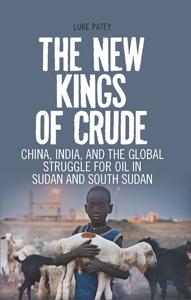REVIEW: “˜The New Kings of Crude’ – fight for oil in the Sudans

 Review of Luke Patey, The New Kings of Crude: China, India, and the Global Struggle for Oil in Sudan and South Sudan, London: Hurst and Company, 2014, pp.357 (with index), Pbk £25.00
Review of Luke Patey, The New Kings of Crude: China, India, and the Global Struggle for Oil in Sudan and South Sudan, London: Hurst and Company, 2014, pp.357 (with index), Pbk £25.00
If you want to know about oil in Sudan and South Sudan and the fascinating role of China in its development, exploitation and conflicts, then go no further than Luke Patey’s new book. It’s a complicated, complex work that reads, at times, like the background for a thriller – especially at the start when talking about the cowboy-booted US oilmen from Chevron visiting the dusty south. But make no mistake; this is not a lightweight, sensational swing through the Sudans for dummies. It is a very weighty work, meticulously researched and mixing knowledge and in-depth analysis of the oil industry in both Sudans with the context of the countries’ conflicts. It sheds a fascinating light on the Chinese and Indian quest for oil concessions as part of their wider economic and energy ambitions.
If there is a criticism, it is that too much time is spent on the travails of the early US oil exploration and exploitation operations in the south with a few extraneous clichés like “the burning coasts and deserts” and the “hardened men” of the US oil companies. But you soon get over this as the intricate detail of the oil industry and its attempts to exploit Sudan’s resources take centre stage. The US and then Chinese and Indian attempts to gain control of Sudan’s oil are set against the background of Sudan’s political landscape and the intricacies of insurgency, counter-insurgency and betrayal that have characterized the war in the south and the subsequent clashes between Sudan and the newly independent state of South Sudan and the latter’s own civil war. The latter conflict may not just be about oil, but the reasons for it are not divorced from the desire of both factions to gain control over resources.
What is interesting is the way that oil lubricates the wheels of politics as well as providing the fluke for conflict and the divisive, manipulative and ultimately self-defeating strategies of Khartoum in trying to retain control of the south and in fomenting divisions among its enemies. The duplicity of successive regimes is brought out well in Patey’s narrative, particularly with reference to the use of groups like Machar’s to undermine the SPLA, and then Khartoum’s attempts to undermine Machar, their ally, within his own group.
The north’s use and abuse of the Misseriya people is particularly interesting, considering the community’s ambitions for control of Abyei and surrounding areas – using them to challenge the South’s claims but ditching them when it was expedient. No wonder the Misseriya turned against the oil companies that they had once been paid to protect by attacking southern rebels.
The single-minded pursuit of a major stake in Sudan’s oil by the Chinese is also expertly charted and in great detail – a treasure chest of references, names and dates for researchers. The party-state-oil company interconnections are set out clearly. As are the reasons for Chinese interest in the development and exploitation, and the declining interest now as limited reserves and mounting conflict do not justify further major investment. These also show their less than altruistic motives in the Sudans. For all their fine words of eternal friendship with the peoples of Africa, the Chinese are now no better (though not necessarily worse, either) than the capitalist companies they have replaced.
Overall, this book is a must for Sudan watchers, China watchers and those who watch the twists and turns of the global oil and energy industries.
Keith Somerville is a, Senior Research Fellow at the Institute of Commonwealth Studies at the University of London, teaches at the School of Politics and International Studies, University of Kent, and is editor of Editor of Africa – News and Analysis (www.africajournalismtheworld.com).






